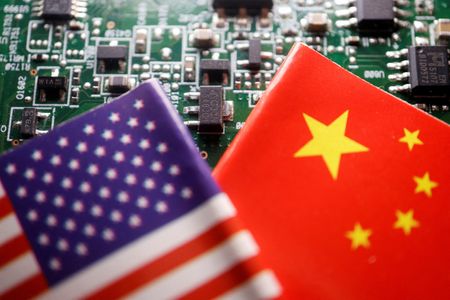By Eduardo Baptista
BEIJING (Reuters) -China will launch an investigation into U.S. government subsidies to its semiconductor sector over alleged harm caused to Chinese mature node chipmakers, the commerce ministry said on Thursday.
Unlike the cutting-edge chips that power artificial intelligence models, mature node chips are cheaper, easier to manufacture, and used for less complex tasks, including home appliances and communications systems.
The investigation is the latest salvo in Beijing’s policy of retaliating against Washington’s ever-broadening scope of restrictions targeting China’s semiconductor industry, which the Biden administration has alleged could go on to dominate global supply chains and help the Chinese military become technologically superior to its U.S.
counterpart.
“The Biden administration has given a large amount of subsidies to the chip industry, and U.S. enterprises have thus gained an unfair competitive advantage and exported relevant mature node chip products to China at low prices, which has undermined the legitimate rights and interests of China’s domestic industry,” China’s commerce ministry said in a statement.
Soon after the commerce ministry’s announcement, the China Semiconductor Industry Association published its own statement supporting the probe.
The association, whose board is made up of executives from the country’s largest chip companies, said the Biden administration’s CHIPS and Science Act, which in 2022 pledged $52.7 billion in subsidies for U.S.
semiconductor production, research, and workforce development, “seriously violated the basic laws of the market economy”.
Beijing’s accusation echoes the Biden administration’s reasoning for announcing a tariff hike on all Chinese chip imports in September, and a probe into China’s mature chip node industry last month, which U.S.
Trade Representative Katherine Tai said had expanded capacity, artificially lowered prices and hurt competition using Chinese state funds.
Washington has also over the past three years tightened export controls targeting the sale of advanced U.S.-made AI chips to China.
It is unclear what retaliatory action will come out of the Chinese government’s probe but U.S. firms such as Intel that sell mature node chips to the Chinese market could be affected.
Intel did not immediately respond to a request for comment.
While China’s semiconductor industry overall lags behind that of the United States, Beijing is widely seen to have retaliated against Washington’s chip curbs using measures such as limiting exports of rare earth metals and launching an investigation into U.S.
AI chipmaker Nvidia over suspected violations of its anti-monopoly laws.
(Reporting by Eduardo Baptista and Beijing Newsroom; editing by David Evans)










